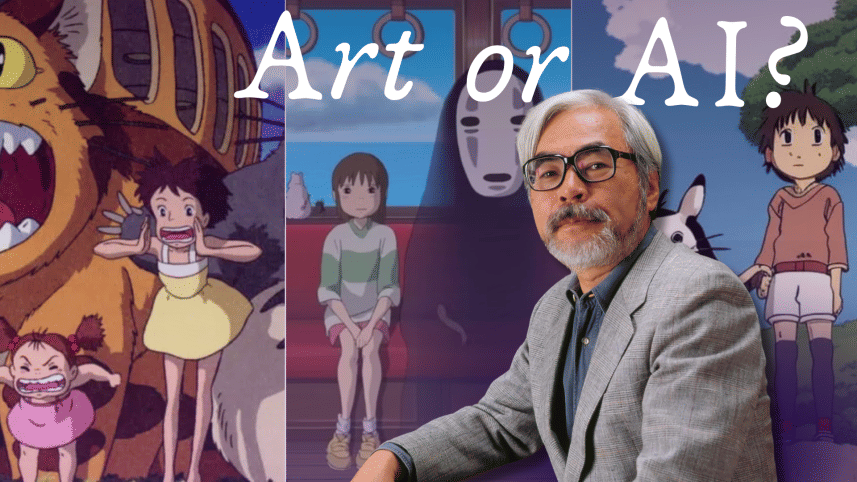ChatGPT AI art trend: Celebrating or stealing Ghibli's charm?

Facebook, X, and Instagram — the trendy social media outlets — have found a new obsession! And this time, it's not a cat meme or a latest viral dance — it's AI-generated Ghibli-style images! Yes! AI is now transforming our non-spiritual world into something straight out of Spirited Away! People are uploading photos of themselves, their neighbourhoods, and even their pets, only to see them transformed into dreamy, hand-painted scenes of Studio Ghibli movies. At first glance, it might seem like a harmless, whimsical experiment. But is it just an experiment? Or does this signal a fundamental shift in how we interact with the art of animation?
On Wednesday, OpenAI upgraded ChatGPT-4o with advanced image-generation capabilities, introducing a native feature called '4o Image Generation.' This latest innovation or upgrade from the US-based AI research company has sparked an online debate drawing comparisons to the artistic legacy of Hayao Miyazaki and the years of craftsmanship behind the frames of Studio Ghibli.
Although Studio Ghibli has yet to comment on OpenAI's use of its distinctive art style, Hayao Miyazaki has been outspoken in his criticism of AI-generated animation. In a 2016 interview, he condemned the technology, calling it "an insult to life itself."
Now, who is Hayao Miyazaki?
Those of us who grew up watching Japanese anime, especially Studio Ghibli films, know very well who this man is! And how his animations influenced us as beings!
In 1985, Hayao Miyazaki, producer Toshio Suzuki, and another renowned filmmaker, Isao Takahata, created Studio Ghibli. Since then, the animation studio's breath-taking graphics and moving narrative have won over fans all over the world.
But now, with AI, and a simple prompt and a few clicks, everyone's able to transform their photos into something that looks straight out of a Miyazaki film.
But is this so-called 'Ghibli-style' AI technology honouring Miyazaki's art or committing an artistic crime? The line is razor-thin here. AI can sure copy the art styles and generate visuals with the right prompt; it can mimic brushstrokes, colour palettes, and even composition — but can it dream like Miyazaki? Can it connect the dots of the storytelling?
The answer is a straight no!
However, the integration of technology into animation is nothing new — AI can simply be the next step in this ever-evolving industry. And the world of animation has always embraced new technologies, from CGI-enhanced backgrounds in Princess Mononoke, to digital compositing in Spirited Away.
But then, there's the ethical dilemma. If AI can replicate Ghibli's style with uncanny precision, does that mean studios could start relying on it, replacing the very animators who bring magic to life? Here, the fear isn't just about imitation — it's about erasure.
Though the purists argue that AI tools don't create — they imitate. Which is true! The algorithm only replicates the brushstrokes and colour palettes — it cannot dream like Miyazaki. It does not understand the essence of childhood, the quiet sunshine of a fading summer, or the resilience of a young girl navigating a world beyond her understanding.
"There's a difference between inspiration and imitation," says Tahsin Tahira Biva, a dedicated anime lover. "What Miyazaki creates is deeply personal. AI can copy his style, but it can never capture the soul of Miyazaki's storytelling through visuals."
Miyazaki, indeed, uses his films to make us hope and dream. His movies are renowned for their detailed frame-by-frame animation, in which, every brushstroke evokes a depth of feeling that, in my opinion, is difficult for an algorithm to match. His art is more than just entertainment; it is a portal to other realms where human emotions, environmental awareness, and youthful wonder coexist together. His films are entire worlds we long to escape into! They are therapeutic! Miyazaki's films have soul. AI, at best, has a mirror!
So, while AI can mimic the appearance of a Ghibli frame, can it replicate its essence? Can an algorithm comprehend the depth of human experience the way Miyazaki does? Can AI give us hope through visuals? Can we separate art from its artist? Can a machine ever dream the way Miyazaki does? And if AI can mimic magic, does it still count as magic at all? These are the questions that will define the future of animation, as AI continues to evolve.
One thing is clear: AI is inevitable at this point, but Studio Ghibli's magic endures not only because of how it looks, but also because of how it makes us feel. And no algorithm — not yet, anyway — can replace that.




 For all latest news, follow The Daily Star's Google News channel.
For all latest news, follow The Daily Star's Google News channel.
Comments